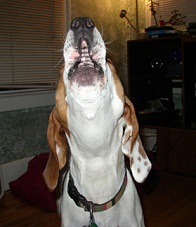
Single-mindedness is a common characteristic that these hounds tend to have, besides their love of sniffing. They were bred to sniff out one thing despite cut backs, distractions, and diminished trails, so this characteristic is indicative of their ancestry, and it is sometimes translated into stubbornness. Once a scenthound has something on his mind or his nose, you better believe that little will distract him. With a large, powerful dog such as a bloodhound, this can be difficult. Fans of bloodhounds encourage owners to keep their dog on a leash, or they may not see their dog for two days because he is on a scent.
Bloodhounds and other large hounds tend to be exuberant puppies, and they may cause a bit of a ruckus in a small or a cluttered house—with their whipping tail, ungainly trot, and drooping flews. That doesnt mean that large hounds dont make good housepets—they do, but for the right person. You may want to consider a hound for your next pet if you have a big backyard, a lot of patience, and a sense of humor.
Smaller scenthounds can also have widely disparate personalities, such as the basset hound, beagle, and foxhound. Basset hounds will not make good apartment dogs, even though they move slow and dont need to exercise as much as other hounds. They tend to vocalize a lot—like most hounds—and they can hurt their backs by climbing stairs, which are present in most apartments. Beagles, even though theyre small, need a lot of exercise and are known to be stubborn. Luckily, most scenthounds love food, so that can help a great deal with their training.




